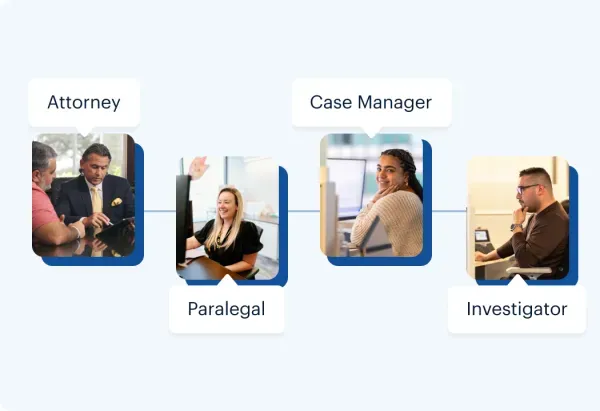Results may vary depending on your particular facts and legal circumstances. The attorney featured above is licensed in Florida. For a full list of attorneys in your state please visit our attorney page.
HOW TO REPORT A NURSING HOME IN KENTUCKY
Nursing home abuse causes deep emotional and physical harm. We fight for justice and accountability.
Results may vary depending on your particular facts and legal circumstances. The attorney featured above is licensed in Florida. For a full list of attorneys in your state please visit our attorney page.
How to Report a Nursing Home in Kentucky
Nursing home abuse is the mistreatment of elderly adults that live in assisted living facilities. Sadly, it's a common problem with 66% of nursing home attendants and staff admitting to abuse of the residents they should be providing care for, according to a 2020 study released by the World Health Organization (WHO).
In Kentucky, there are currently 22,537 seniors living in certified nursing homes. Some of them are certain to have experienced one form of abuse or another if the WHO study is considered. Suppose you are experiencing abuse or you have a loved one you suspect is being abused. In that case, you're probably wondering how to report a nursing home in KY. In this article, we'll detail how to report a nursing home for abuse or neglect, but you can get help quickly by contacting one of our nursing home abuse lawyers. You and your loved one may be eligible not only for compensation for the abuse, but we can make certain disciplinary action is taken against guilty parties.
100,000+ Five Star Reviews
The reasons why clients trust Morgan & Morgan.
Results may vary depending on your particular facts and legal circumstances. Based on select nationwide reviews.
Our Results
How It Works
Unsure what to do next? With 35 years of experience, our personal
injury lawyers will guide you every step of the way.

Contact Us 24/7 - It’s Free
Start your claim

Meet your dedicated attorney
Meet the attorneys

We fight for more
Learn more about the case process
Results may vary depending on your particular facts and legal circumstances. The attorneys shown in these photos may not be licensed in your state. To find an attorney licensed in your area, please visit our attorney page.
Local Care
Backed by America’s Largest Injury Law Firm.
$30 Billion
Recovered for clients
nationwide700,000+
Clients and families
served1,000+
Attorneys across
the country1
Click may change your life
The attorney featured above is licensed in Florida. For a full list of attorneys in your state please visit our attorney page.
Results may vary depending on your particular facts and legal circumstances.
In the Community
Discover the local Morgan & Morgan experience with news, events, and partnerships.
Learn More
Injured and not sure what to do next?
We'll guide you through everything you need to know.
What agency oversees nursing homes in Kentucky?
The Division of Health Care inspects, licenses, monitors, and certifies all health care facilities as well as investigates reports of nursing home abuse. They have four regional branches, and complaints should be submitted to the appropriate branch for your county. Official complaints should contain information including the name of the facility, the facts of the complaint, who the alleged perpetrator(s) are, any witnesses, and the names of all involved. Here is an exhaustive list of all the information a complaint should include.
You can also contact the following Kentucky State Government Agencies who can help you file a complaint:
- Kentucky Cabinet for Health and Family Services
- Kentucky Office of Attorney General
- Kentucky Office of Inspector General
Furthermore, you can contact a long-term care ombudsman who can help investigate complaints on behalf of residents without identifying the resident or family member that made the complaint. An ombudsman will first investigate the complaint to verify details and document it in a report. The details are shared with the complaining party, and if there is no way to resolve the conflict, the ombudsman will help you find other solutions.
What are the signs of neglect in a nursing home?
Unfortunately, nursing home neglect has become a prevalent problem, especially because of the pandemic. Staff shortages, long hours, and burnout can cause nursing home staff to fall short of the care they should be providing. Even so, there is no excuse for nursing home neglect, and it should not be taken lightly. Neglect can lead to serious issues like dehydration, bedsores, and lack of essential medical care. Here are some signs that could indicate nursing home neglect:
Medical neglect: Residents are not getting their medications when needed or not receiving care for diagnosed conditions like dementia or Alzheimers. Staff may not be moving seniors with mobility issues, leading to bedsores and infection. Finally, staff may not be reporting signs of infections or illness to the medical personnel.
Social/Emotional neglect - Interaction with others is a human necessity. Social stimuli can help with elderly residents' emotional well-being. When a resident has mobility or cognitive issues, it's easy for them to be isolated and ignored. Failing to provide wheelchairs or walkers to vulnerable residents, making them stay in their rooms alone is a sign of social neglect.
Basic living needs neglect - Making the nursing home facility a safe and comfortable environment fulfills basic living needs. If the nursing home is too cold in the winter or too hot in the summer, this is a failure to provide a livable environment. A nursing home should be kept clean and free from hazards. Furthermore, fresh food and water should be provided to residents to ensure they are properly nourished and hydrated.
Personal hygiene neglect - Good hygiene is a fundamental human right. Poor hygiene can lead to serious medical complications and can impact an elderly person’s mental health. Nursing home residents should be able to expect their clothes will be changed daily, and any soiled clothing or bedding be changed promptly. Furthermore, residents should expect to be bathed regularly.
Additional signs of nursing home neglect:
- Unexplained injuries
- Bedsores
- Notable personality changes
- Burns
- New or untreated medical problems
- Malnutrition
- Dehydration
- Bruises
- Broken bones
- Personal hygiene problems
- Insomnia
The causes of neglect can also be tied to negligent hiring practices. For example, proper background checks should be expected. People with a history of drug use or alcohol abuse are not typically qualified to care for others because they are statistically more likely to abuse other people. Hiring former criminals to care for frail elders is a recipe for disaster. Still, sadly, some nursing homes, even major nursing home chains, will go ahead and hire people with criminal records to care for your elderly loved one.
The Department of Health and Human Services performed a study and found that 92 percent of nursing facilities employed at least one person with at least one criminal conviction. And even more surprising, Federal law does not require nursing home facilities to conduct State or Federal Bureau of Investigation (FBI) criminal background checks. The only requirement is that they cannot hire anyone that has been found guilty of abusing, neglecting, or mistreating residents or who has been entered into the State nurse aide-registry for the same.
Another reason for the neglect is poor training of staff or volunteers. Most times, inadequate training results from lack of funding or lack of concern. Nursing homes have a legal duty to provide reasonable care to their residents. This can only happen if the staff has a reasonable amount of training. Nursing home staff should be well-versed in policies and procedures, which can include how to administer medication to residents, when to call a doctor, what to do in an emergency, how to handle particular medical conditions, and how to avoid common accidents like falling. If you or your loved one was harmed due to lack of staff training, the nursing home could be held liable for injuries.
What are the signs of nursing home abuse?
A 2020 report from the WHO estimates that 1 in 6 adults over the age of 60 has been victims of abuse in nursing homes. Yet, this number is probably lower than the reality since only 1 in 24 cases is ever reported. Physical abuse is anything that harms an elderly resident leaving them with injuries. It takes much longer for older people to heal from injuries, and sometimes these injuries can lead to death. Elders most at risk for physical abuse have mental or physical illnesses or have other forms of disabilities. Suppose you or a loved one experienced any of the following in a nursing home. In that case, we might be able to help you with a legal case against the facility or the abuser:
- Bruising
- Kicking
- Hitting
- Punching
- Restraining
- Pushing
- Shoving
- Scratching
- Slapping
- Sexual assault
How much is a nursing home negligence case worth?
We understand gaining compensation for nursing home abuse or neglect isn't a magic wand that makes the feelings of betrayal and hurt go away. Still, it can help the victim, and their family pay for medical treatment and move forward knowing justice has been done.
Nursing home abuse compensation is the financial payment that is awarded after a successful legal case; The compensation is paid by the nursing home facility, the perpetrators of the abuse or neglect, and their insurance companies. Compensation can either be paid by an out-of-court settlement or through a courtroom verdict.
The amount that can be awarded depends on a number of factors like how severe the abuse was, the injuries, and the parties involved, but an average number for compensation is in the $400,000 range.
Examples of nursing home abuse settlements and verdicts
$42.5 million - In California, an elderly woman was regularly given Ativan without her consent to treat agitation. The woman developed pneumonia because of the drug and died shortly after, resulting in a wrongful death lawsuit.
$8 million - An elderly nursing home resident in Washington received this settlement after a nursing home staff member raped her several times. The staff member was fired and later arrested for his crimes.
$1.8 million - In Georgia, a nursing home settled after a nursing home aide forcefully rolled an elderly patient aside to change her bedding. She rolled off the bead and suffered a serious brain injury leading to her death. Her family was awarded damages for pain and suffering.
$1 million - In Massachusetts, an elderly woman was found to have fallen 20 times at an assisted living facility, and the last fall led to her death. It was later discovered that she had untreated internal and head injuries. The nursing home settled with the family after they brought a lawsuit.
$43.5 million - In Georgia, an 80-year old man died after suffering several falls, one of which broke his hip. His family was never notified of his injuries because of the so-called lack of staff and resources. The family was compensated for his wrongful death.
How can Morgan & Morgan help?
Learning how to report a nursing home in KY is the first step to gaining justice for your loved one. Our nursing home abuse lawyers can make sure the guilty are held accountable for their actions or inactions. While financial compensation might not be the first thing on your mind, you have to consider how a successful lawsuit can impact your loved one. Compensation can help you get your loved one into a better facility and can pay for medical expenses.
Our lawyers have an exceptional track record for success and go after wrongdoers by conducting in-depth investigations that leave no stone unturned. Once we evaluate all the evidence, we present our legal arguments and either win a settlement or take it to court to let a jury decide. You don't have to worry about any upfront costs either. Once we take on your case, you don't pay anything unless we win.
We know how hard it is to deal with the fact that your loved one was a victim of abuse at the hands of those that were supposed to care for them. Our compassionate lawyers will help you every step of the way so you can get on with the healing process. Contact us today for a free, no-risk case evaluation.

























